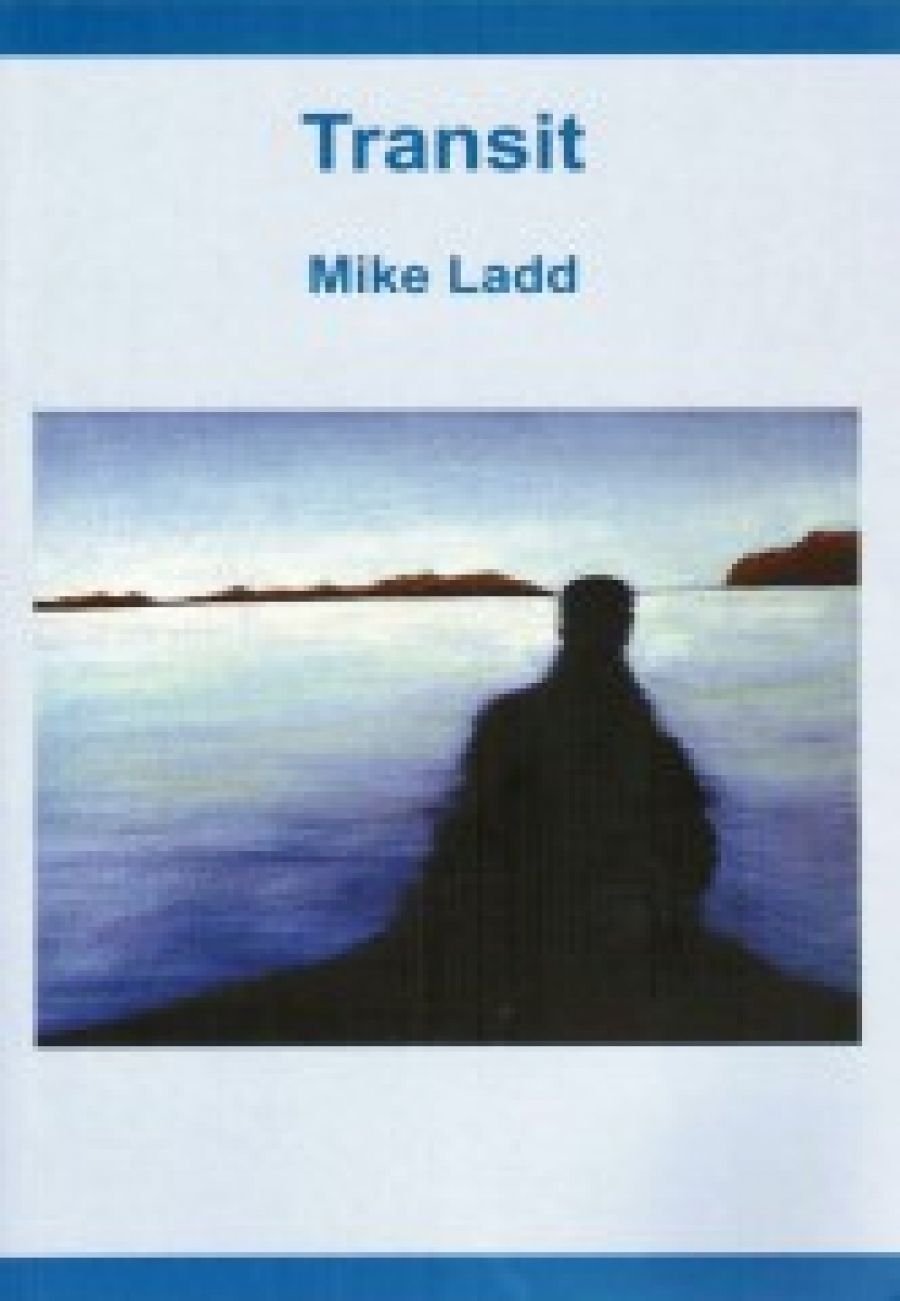
- Free Article: No
- Contents Category: Poetry
- Review Article: Yes
- Article Title: Less pay, better work
- Online Only: No
- Custom Highlight Text:
In his poem ‘Reunion’, Mike Ladd takes us back to his old school in Adelaide. Three stanzas recapitulate the journey before another four talk us through the fate of the poet’s former schoolmates. Some of these outcomes are predictably neat: ‘How the wild girl became a matron, / and the prim one, a single mum, at seventeen.’ The ‘cop’s son’ ‘was shot dead in Afghanistan, / a mercenary, picked off by sniper fire’, while ‘the thin and gormless one / made a fortune dealing stocks’.
- Book 1 Title: Transit
- Book 1 Biblio: Five Islands Press, $21.95 pb, 64 pp (with CD)
- Book 1 Readings Link: booktopia.kh4ffx.net/a1zjMo
‘We thought you’d be a judge,’ one said.
‘You seemed to walk the walk.’
I chose poetry instead,
less pay, but better work.
There was a girl to ask for pardon,
the one whose lunch-box I spat inside
because I loved her, but couldn’t unburden –
she was the one who didn’t arrive.
I have chosen to quote these stanzas because they seem to me to introduce us to issues which illuminate the strengths and weaknesses of this collection. Disgusting as the image of spitting into a lunch box is, at least it carries with it an emotional charge and resonates backwards and forwards, creating tension with the idea that the perpetrator might have been mistaken for a man of law, and with his still unburdened guilt about his adolescent actions. Although we might find the concluding line of the poem too neat, there is a pleasing complexity in these lines and a sense of something genuinely ‘felt’; the poet here is fully engaged.
It is in such moments that Ladd’s writing gains force. There is a wonderful poem about ‘Junior Football’, wherein Ladd deploys the iambic pentameter as his guiding measure to deliver a vivid and recognisable cast of characters on the suburban sidelines. The poem is punctuated by the simple phrase ‘I like’, but in context the reader feels this to be absolutely genuine, and what is there not to like in:
Sweet oranges that grin from plastic buckets,
clouds of liniment in tatty changing rooms,
the smell of mud and grass between the sprigs
that clatter onto concrete like sudden hail.
Although it is not as evenly sustained, there are some similarly memorable passages in the longer poem ‘Rhapsody in Port Moresby’, and ‘A Window in the Bronx’ delivers a moving portrait of a poet feeding sparrows, ‘Unconcerned that these / are common birds, / ordinary citizens of the air’. Later in the poem, a metaphoric comparison is suggested which leaps from the sparrows to ‘Acts of bravery, small and large, / by men and women, workers in the fields’. It is these humble citizens that keep liberty alive in the face of ‘a system eroding liberty’. There is real subject matter here, and one feels Ladd’s commitment to it.
Unfortunately, in many other poems in this volume, I missed such pleasures. There is always nice observation of landscapes, family and social situations, but often it is delivered without any emotional or intellectual edge. Like loose knitting, too many of the poems lack tension. Images, often of the natural world, are delivered for their own sake; they tend to prettiness rather than beauty. On the few occasions when Ladd attempts to draw out the metaphoric significance of his imagery, we are led into bathos or an epigrammatic mode which lacks punch. In ‘Philosophical Autumn’, for instance, a conversation in a sunlit garden and an image of a parrot in a pin oak tree, letting ‘seed husks fall’, is punctuated by the following lines: ‘even if Death / is what lets us live / in the first place / I dread that loss.’ This seems limp rather than limpid. Similarly, a poem describing natural life on a hill finishes too easily:
The hill on which nothing happens
holds its rich, secret lives,
its little universes,
until the bulldozers arrive:
the supernova of real estate.
Bravely, Ladd writes a poem ‘In Praise of the Colour Grey’, which concludes with a dying fall: ‘In this age of new rigidities / I praise the colour grey, // emblem of fields uncertain – / it might go either way.’ These sentiments might be admirable, but it is hard to be enthusiastic about the poem or about the other shades of grey one finds in this collection, notwithstanding titles such as ‘Pink’ and ‘Yellow’.
In ‘Reunion’, Ladd implies he took up poetry as a career rather than the law – ‘less pay, but better work’. He will be known to many readers as the producer and presenter of ABC Radio National’s poetry programme Poetica. Reading this collection made me wonder whether the twin pressures of dealing with many other poets’ words and of attempting to forge a career in poetry had led Ladd into feeling he ‘needed’ to publish another book before he had sufficient material of equal quality to justify such a publication. It is a pity that the few excellent poems here are surrounded by much work that is uneven and less impressive. The inclusion of a CD, upon which it takes Ladd twelve and a half minutes to read his ‘Rhapsody on Port Moresby’ to the accompaniment of drums, flute, sax and bass, does not enhance the package. The sepulchral pace of the reading asks his lines to bear a weight that they resolutely refuse to carry.


Comments powered by CComment